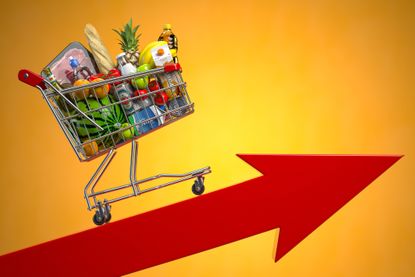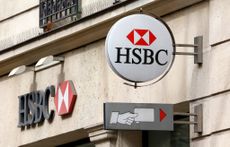Inflation goes up to 5.5% - what does this mean for you?
Inflation goes up again - we take a look at what it is and how it impacts the cost of living


Inflation - the rate at which prices are rising - has hit 5.5% in the 12 months to January, up from 5.4% in December, adding further pressure to household finances.
Rising clothing and footwear prices, combined with record fuel and energy prices, have helped push the CPI measure of inflation to its highest level in 30 years.
Worryingly for families, food and non-alcoholic drink prices are continuing to go up, including staples, such as pasta and eggs, which are more difficult to cut back on. Experts expect prices will continue to rise - and at a faster pace - in the coming months.
“Further and material increases in inflation are almost certainly coming,” says Jason Hollands, managing director of Bestinvest, “in part due to the lifting of the cap on energy bills – so the thumb screws are going to continue to tighten over the coming months, with the Bank of England forecasting inflation will hit 7% by Easter.”
“The combination of rising prices, higher taxes, rising borrowing costs and lagging wage growth are going to squeeze many household finances over the coming months.”
We look at why inflation is so high right now and the impact on your household money, from savings to mortgages.
What is inflation?
Inflation is the measure of how much the cost of living is increasing over a set period of time. Deflation is when prices are falling in an economy.
Look After My Bills Newsletter
Get the best money-saving tips, tricks and deals sent straight to your inbox every week. Make sense of your money in partnership with The Money Edit.
While consumers may not like the idea of rising prices of goods and services, a certain amount of inflation is good for an economy because companies have more money to invest and increase wages. Too much, however, means that our wages can’t buy as much as they used to and living standards fall.
Too little inflation - or deflation - and the economy slows: consumers are reluctant to buy, fearing prices may fall further, as a result businesses have less money to invest and wages fall or jobs are lost.
The Bank of England sets a 2% target rate for inflation. Raising or lowering interest rates is one tool that the central bank can employ in an attempt to keep inflation low and stable.
How is inflation measured?
UK Inflation is measured by economists at the Office for National Statistics using a virtual ‘shopping basket’ of around 700 popular items. Every month, around 180,000 prices of these items are monitored to see how they compare to the previous year. What goes into the shopping basket changes as our spending habits do. For example, during the pandemic hand sanitiser was added to the basket, as were dumbells and comfy clothing.
There are a number of different measures of inflation used, the most common being the consumer prices index CPI measure, which is currently at 5.5%. The Retail Price index, which has increased to 7.8% from 7.5% the previous month, is older and tends to come out higher. Unlike CPI, RPI includes mortgage interest payments in its calculations and so is heavily influenced by interest rates and house prices.
A newer measure of inflation is the CPIH, which includes owner-occupiers’ housing costs using rental equivalence, is currently at 4.9%.
Why is inflation going up?
Inflation has been rising in many countries across the globe, since Covid restrictions ended earlier this year and economies re-opened. Rising wholesale energy prices have been felt by households and businesses, which have been forced to pass on the extra costs to their customers pushing inflation and prices up further. Global shortages due to supply chain issues caused by the pandemic or Brexit have also filtered through to the costs of certain goods.
Many of the price rises seen in January’s inflation figures have been around for sometime. Petrol has increased from 116.6 pence per litre a year ago to 145.1 pence in January. Unfortunately this trend looks set to continue.
“Petrol has unfortunately hit a frightening new high of 148.02p in February which takes filling a 55-litre family car to an eye-watering £81.41”, says Simon Williams from the RAC. This is £17.28 more than you would have paid in January 2021.
Second-hand cars are also up 28.7% in a year due to a continued shortage of the semiconductor chips that has impacted the motor industry since the start of Covid-19 lockdowns.
The current energy price cap means that the rising wholesale costs haven’t fully fed through the inflation figures yet, but expect that to change when the cap rises again in April by £693. Even so, gas prices are still up 28.3% and electricity 19.2%.
Other factors that have fed through to January’s figures include rent prices, which have been soaring, especially in cities, as workers return to the offices and many landlords sell their properties to take advantage of rising house prices. According to Zoopla, advertised rents are up 8.3% in a year to £969 a month.
Rising clothing and footwear prices (6.3%), household equipment and maintenance (8.4%) and food and non alcoholic beverages (4.3%), have also been key drivers of inflation. Worryingly for families looking to cut back on costs, many of the biggest rises seen in food prices are for staples such as margarine (37%), pasta (15%) and eggs (8%).
WHat does it mean for my money?
Inflation is rising faster than wage growth, meaning your money doesn’t stretch as far because everything is getting more expensive and living standards fall.
High inflation also has an eroding effect on your savings. There is currently no savings account that pays a rate of interest anywhere near the current rate of CPI. The two recent rate rises by the Bank of England have had little impact on the market.
The market leading easy access accounts, from Cynergy Bank and Investec Bank plc, pay just 0.71% while Paragon Bank's new easy access ISA leads the way with 0.65% interest.
“Higher inflation erodes savings to the point where it becomes hard to justify keeping anything but the minimum in an emergency savings account if you don’t want to lose the value of your savings in real terms,” comments Becky O’Connor, head of pensions and savings at the investment platform interactive investor.
“Anyone looking to put money away safely will have to effectively give up the prospect of real returns until inflation is under control and interest rates are off the floor.”
Pensioners will particularly feel the pinch if inflation continues to climb. The suspension of the triple lock means that the state pension will increase by 3.1% (as per September inflation figure) in April, substantially lower than the 7.25% that inflation is expected to hit at the same time.
Becky O’Connor notes: “For pensioners and others on limited incomes, this level of inflation is hard to cope with. Careful budgeting only gets you so far. Those already on the cheapest possible deals, the lowest tariffs and buying the cheapest food have very little wriggle room. There’s nowhere left to hide. You will always be spending something on food, energy and fuel if you drive and these are among the categories where prices are rising the fastest.”
What can be done to tackle inflation?
For savers willing to tie up their money for several years and take on some risk, investing in the stock market can offer a better chance of growth, which could beat inflation.
“Standing still means you are getting worse off in this environment as inflation gnaws away at the spending power of your wealth,” says Jason Hollands of Bestinvest.
“I would urge people to think about whether they have the right balance between cash savings and longer-term investments. While it is very wise to keep a cash buffer for short-term needs and emergencies, holding too much cash for long periods of time will see the real value of this wealth eaten away by inflation.”
Read our article: 5 ways to cut your bills as inflation hits a 30-year high
Georgie is a multi award-winning financial broadcaster and journalist. She is a trusted voice on all matters personal finance and consumer affairs, hosting a number of money podcasts and appearing regularly on TV, radio and in print. Georgie speaks with both authority and personal experience. Before moving into money journalism, Georgie spent a decade traveling around the country as a BBC sports broadcaster, however a spinal injury changed that. Georgie's journey into and out of debt due to her injury sparked a deep interest in consumer rights, financial education and social mobility, which drives much of her work today.
-
 Three energy firms pay £8m in switching compensation - has your provider paid out?
Three energy firms pay £8m in switching compensation - has your provider paid out?More than 100,000 customers have received compensation after changing providers, but is now a good time to switch energy suppliers?
By Tom Higgins Published
-
 Save £300 on your supermarket shop with cashback accounts
Save £300 on your supermarket shop with cashback accountsBanks, credit card companies and cashback sites are all offering cashback on your supermarket shop, but can you use them all to max out your savings?
By Vaishali Varu Published
-
 Save £300 on your supermarket shop with cashback accounts
Save £300 on your supermarket shop with cashback accountsBanks, credit card companies and cashback sites are all offering cashback on your supermarket shop, but can you use them all to max out your savings?
By Vaishali Varu Published
-
 More than 150,000 grandparents missing out on £1,500 state pension uplift: how to claim
More than 150,000 grandparents missing out on £1,500 state pension uplift: how to claimGrandparents who provide childcare by looking after their grandchildren could be missing out on valuable state pension money worth thousands. We look at how much extra you could get and if you’re eligible
By Stephanie Baxter Published
-
 Can you reclaim bank charges?
Can you reclaim bank charges?If you’ve incurred bank charges over the years, these can add up to hundreds of pounds – but can you get your money back? We look at whether you can make a claim and how to do it
By Stephanie Baxter Published
-
 HSBC extends deadline for customers to secure bigger interest-free overdraft
HSBC extends deadline for customers to secure bigger interest-free overdraftHSBC customers now have until 10 May to increase their interest-free overdraft limit from £25 to £500. First Direct, Lloyds and Nationwide also offer similar support. We explain everything you need to know
By Katie Binns Last updated
-
 New banking hub locations revealed - is there one near you?
New banking hub locations revealed - is there one near you?The rise of banking hubs is in response to a stream of local branch closes. With more planned to launch soon, we look at what services they offer and where you can find one
By Stephanie Baxter Published
-
 April 2023 premium bond winners revealed - are you a millionaire?
April 2023 premium bond winners revealed - are you a millionaire?Two premium bond holders have won £1 million each this month and there are many other prizes for another 5,018,742 winners in April. We look at how to find out if you’ve won
By Stephanie Baxter Published
-
 State pension underpayment warning - have you been underpaid and eligible for more than £11,500?
State pension underpayment warning - have you been underpaid and eligible for more than £11,500?Thousands of retirees, mainly women, are still owed money by the government after being underpaid their state pension. We explain what you need to know
By Katie Binns Last updated
-
 State pension age rise to 68 delayed - what it means for your retirement
State pension age rise to 68 delayed - what it means for your retirementThe state pension age will stay at current levels for longer than expected after the government today confirmed that it has shelved plans to increase it to 68 by the late 2030s. We explain what it all means for you
By Stephanie Baxter Last updated